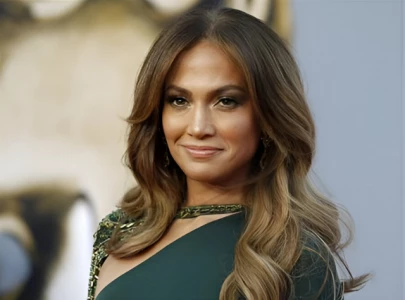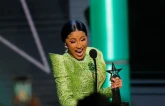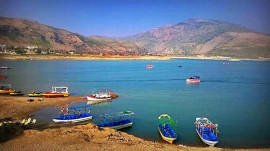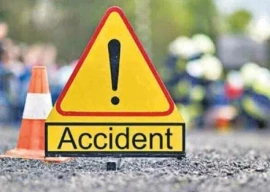Though there are many flaws in Pakistan’s politics, young people must realise that participatory democracy is the only way the country can progress, speakers at the Intergenerational Democracy Symposium said on Wednesday
Some 200 delegates from all over the country participated in the one-day symposium organised by the Youth Parliament of Pakistan (YPP) in collaboration with the United Nations Democracy Fund. The symposium was attended by not just young people aged 18 to 35, but also older politicians, journalists and social activists.
YPP Sargodha district project manager Amir Bilal told The Express Tribune the symposium was aimed at inculcating democratic attitudes in the youth. Law student Bilal said the event was held in light of a 2009 British Council report titled Pakistan - The Next Generation, which showed that very few young people were inclined towards democracy. “We wanted to expose people to those that have worked for democracy,” he said.
The symposium consisted of two themed sessions. A cultural night was held later.
Inclusive Democracy
The first session titled Building Inclusive Democracy in Pakistan: Mirage or Reality? included a number of young politicians.

“Democracy will come in Pakistan when we inculcate democratic attitudes in the people,” said Sindh Minister for Youth Affairs Faisal Sabzwari. He said democracy is more than just a system of governance. He said people have formed opinions without understanding actual issues. He said the curriculum needed revision to highlight the role of non-Muslims in the struggle for Pakistan. “The system will never succeed without addressing the needs of the poor,” he said. He denied there was any discrimination in Karachi and said his party had no role in weaponising Lyari.
“Young people need to overcome the fear of the system ingrained by previous generations,” said Talha Chishti, the deputy director of the Citizens’ Commision for Human Development. He said an inclusive democracy required a local government system. “Give democracy time,” he said, “We must realise it is the best form of governance.” However, Chisthi criticised dynasty politics.
Sharmila Farooqi, special advisor to the Sindh Chief Minister, spoke about her experience entering active politics as a young person. “On the bright side, young politicians have greater access to people and the ability to present progressive ideas,” she said. Addressing the criticism of dynasty politics, Farooqi said a young person must not be dismissed for having relations with prominent established politicians. “Assess them on their own ideas,” she said.
“Without votes, dynasties have no power in politics,” said Kamran Shafi, a columnist and former press secretary to the prime minister. He pointed to the Kennedys in the US and the Gandhis in India to suggest that dynasty politics was a global phenomenon.
“The security establishment is the biggest enemy of Pakistan,” he said He also said that democracy was inherently inclusive.

Stakeholders Approach
The last session was titled Democracy in Pakistan - Multi-Stakeholders Approach and included discussions on how various segments can contribute to democracy. The session was moderated by YPP development consultant Malik Masroor Haider. Haider said the lawyers’ movement had made lawyers a stakeholder in the present system.
Jamaat-i-Islami (JI) representative Salman Baloch, speaking in place of Liaqat Baloch, said the JI youth wings had worked for the welfare of the country. He said both the Islami Jamiat Talaba JI’s student wing) and Shabab-e-Milli (JI’s youth wing) had contributed to the progress of society. “The challenge is to ensure people vote for those who talk about Pakistan and Islam,” he said.
Mohsin Kamal, a member of the YPP’s National Youth Assembly, said the youth had a role in implementing policies but should not make policies to gain political mileage. “Democracy only prevails when the rights of people are upheld,” he said. He said nepotism and dynasty politics were preventing young people from participating in politics.
“We discourage childhood marriages but are fine with entrusting a political party to children,” journalist Mahmood Sham said. He said young people should “read history to know the conditions under which the military took over the country.”

“Since 1954 the military has never come into power voluntarily, they have always been invited by weak politicians,” he said. He said the biggest hurdle towards a smooth democracy was not the military but landlords and feudals.
Punjab Assembly Deputy Speaker Rana Mashood expressed regret that a large part of the population stayed at home on Election Day instead of voting.
“Go out, vote and contribute,” he said.
He said the large youth population meant political parties must address their needs. Speaking about the Punjab Youth Festival, he said that Guinness Book of World Recorrds officials are expected to announce it as the world’s largest youth festival. He commended the YPP’s contribution to the dengue awareness campaign and for “unearthing as many as 100 grounds to convert into parks and play grounds.”
“The movement for the restoration of the judiciary was not only a lawyers’ movement but was embraced by the public at large,” said former Lahore High Court judge Justice (retd) Nasira Javed Iqbal. She said the legal fraternity had a significant role in the democratic system before independence. “Almost 70 percent of the leadership were lawyers,” she said.
Pakistan Tehreek-i-Insaf (PTI) women’s wing Central President Fauzia Kasuri said there was a need for women to play an active role in building the democratic system. Kasuri said it was the PTI that initially focused on the youth population and other parties followed suit.
Published in The Express Tribune, December 13th, 2012.





1732012115-0/Untitled-design-(14)1732012115-0-270x192.webp)











COMMENTS
Comments are moderated and generally will be posted if they are on-topic and not abusive.
For more information, please see our Comments FAQ